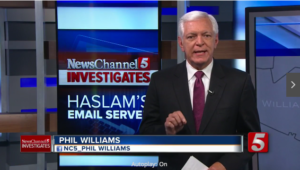Haslam staff used private email accounts for state business
While the U.S. State Department’s inspector general on Wednesday released a blistering analysis of Hillary Clinton’s use of private email, back in Tennessee reporter Phil Williams of NewsChannel 5 reported a nugget about the use of private email by Governor Bill Haslam and his staff.
Williams made a public records request of emails on the state email server of a handful of administrators that either were received from or sent to a private email address containing @billhaslam.com, a domain for the governor’s campaign webpage.
Although it was only a snapshot for a defined slice of time, the request turned up several emails discussing state business that originated from the governor’s former chief of staff, Mark Cate, and others in the Haslam administration who had a private email account through billhaslam.com.
Williams interviewed me for the story (see Williams’ story), and showed me a sampling of the emails. They were clearly state government business, and sometimes included state government officials with state email accounts instead using their private accounts to discuss business with each other. They ended up on the state server because at least one person in the email chain at some point forwarded or copied the email to their state account.
From the story, Governor’s Private Email Used For State Business:
We found state budget officials — from state accounts — briefing the governor himself at a billhaslam.com email address.
The governor’s executive assistant, Janet McGaha, also usesbillhaslam.com, corresponding in a couple of cases with then chief-of-staff Mark Cate — again at billhaslam.com.
We showed the emails to Nashville Tea Party activist Ben Cunningham.
“Obviously, they are using this private server to discuss public business,” Cunningham said. “Those are public records.”
In one example, Cate used that account to email an education activist about Common Core, copying Haslam’s education commissioner — also apparently using private email.
In another case, a lobbyist emailed Cate at billhaslam.com about a letter he wanted the governor to sign.
Cate sent it on to the governor’s policy director, Will Cromer, also atbillhaslam.com.
The governor’s office says any use of that account for official government business was “inadvertent and a rare occurrence.”
And like Hillary Clinton, officials say the fact that such emails were eventually forwarded to the state email system shows they weren’t trying to hide anything.
The last point about forwarding email to the state email system would hold more weight for me if all of the email on the private accounts conducting state business were forwarded by all of the administrators sending or receiving it all of the time. Frankly, we only know what was forwarded to state email accounts here and there – not how much was not.
State officials told Williams that they had “no idea” what the retention policy was for billhaslam.com – another troubling indicator that it might not be a priority to preserve public records that might sit on the private server.
These are the type of problems with habitually using private email for government business to begin with. The state should have policy about not using private email for government business, and respect for public records should be a high enough priority that top administrators, such as within the Haslam administration, should be leaders in making sure they are properly preserved.
If officials insist that they still might inadvertently use their private email for government business, then those same officials should let records custodians know, and if a relevant public records request is made, they should offer up their email to be independently searched for possible responsive records.
A key question that remains unanswered is how regularly the private email of Haslam staff members was searched when a journalist made a request for correspondence on particular topics. The governor’s office told Williams they searched the governor’s private email account in response to his request for correspondence about a contract to outsource state office buildings. Was this standard practice? I don’t think we know.
The inspector general’s report on Clinton’s use of private email points out the problem with preservation that Tennesseans should be concerned about as well: From the Washington Post:
The report by the inspector general’s office concludes that Clinton, the Democratic front-runner for president, handled email in a way that was “not an appropriate method” for preserving public records and that her practices failed to comply with department policy. The review found that Clinton, who has said her system was secure, also never provided security details to agency officials responsible for safeguarding sensitive government information.
The 83-page report reviewed email practices under the past five secretaries of state and found persistent problems with ensuring that records are preserved in keeping with federal law.
One of the biggest concerns about Clinton’s use of private email is the question of security of classified material. The FBI is examining whether she mishandled classified material through the use of private email.

